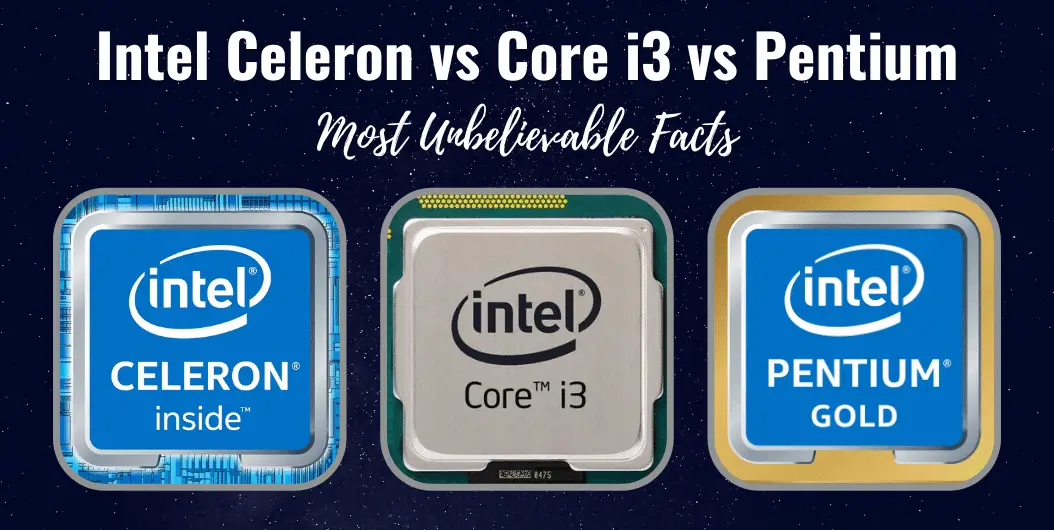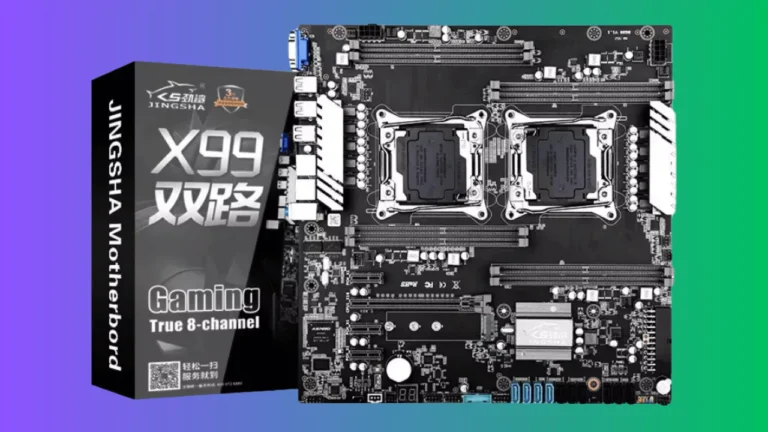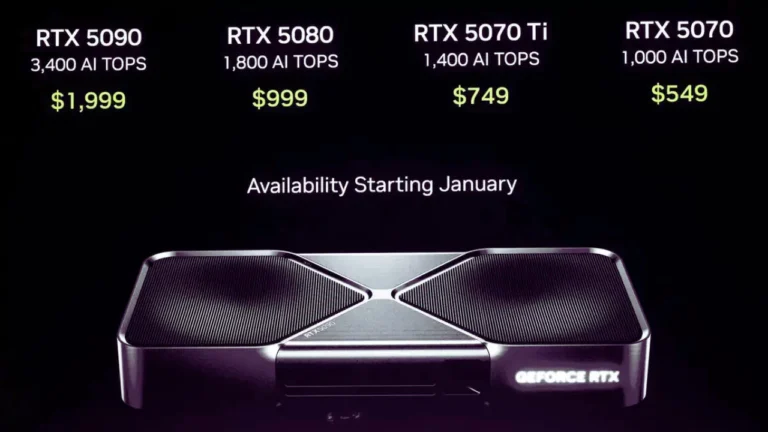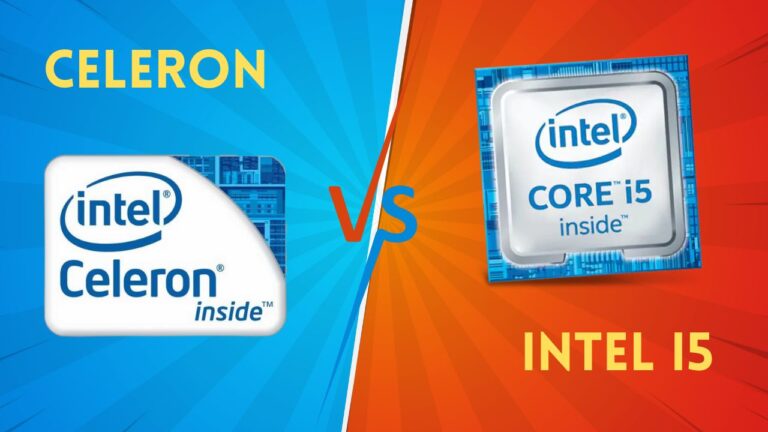By putting the three of the most popular and widely used computer processors head-to-head, we will see which comes out to be a better performer. The fastest Celeron processor runs at 2.8 GHz, while on the other hand, the fastest Pentium chip runs at 3.8 GHz. Celerons have a lower bus and a smaller cache than Pentium CPUs.
Celeron
The Celeron is a dual-core CPU with no hyperthreading that runs at 3 GHz and is based on the Core architecture. It compensates for the performance gap with a lower price and lower power usage. Celerons with four cores are also available, although these are based on much slower Atom CPUs.
Core i3
A Core i3 processor outperforms a Celeron processor by a wide margin. It’s worth noting that updating your CPU will ensure that your laptop lasts longer, even if you simply use it for minor tasks.
Pentium
Pentium chips were the most extensively used CPUs for general-purpose computing during their reign as “the” Intel processor. Several Pentium versions have been produced for entry-level PCs and other devices since Intel’s Core family grabbed the top spot in 2006.
Can The Intel Celeron Turn Out To Be An Ideal Processor?
Intel Celeron processors are suitable for embedded PCs that will be used mostly for basic tasks. Celeron class PCs are generally excellent for various basic-use applications, and small businesses tend to choose dual-core CPUs due to affordability. Processors based on the Celeron architecture are widely available.
Celeron vs Intel Core i3
The Core i3 has an –
- Increased effective speed by a significant amount.
- Memory latency has been significantly reduced.
- Single-core performance has improved dramatically.
- The speed of a dual-core processor is significantly higher.
The core processors feature significantly greater cache memory than Intel’s other processors, yet the same bus speed. They also get a “turbo boost” feature, which allows the CPU to overclock itself for short periods of time. Moreover, hyper-threading is also enabled, resulting in even better multi-core performance.
Pentium Over Celeron
The capability known as “hyper-threading” is the key advantage Pentium chipsets have over Celerons. The operating system can use this feature to “divide” each processor core in half.
As a result, a dual-core Pentium can functionally perform in the same way as a quad-core Pentium. Hyper-threading, according to the manufacturer, can enhance computing performance by up to 30% during CPU-intensive workloads.
Performance of the Processors
The Pentium used to be Intel’s high-end CPU, but the Core series has since superseded it, reducing it to a mid-tier product. The Core line is designed for enterprises and entrepreneurs, and it features improved figures all around.
They have similar clock rates to Pentium chips, but they don’t have the two CPU core limit.
In addition, the top of the series, in fact, has 18 cores, making it several times faster than the lower-end models.
However, this performance comes at a cost, with the most expensive Core processors costing over $500, compared to a Celeron processor costing around $100 and a Pentium costing between $100 and $200.
Let us here understand with examples of each processor variant about the performance and integrated part.
| Intel Celeron 5205U | Intel Core i3 10110U | Intel Pentium Gold 6405U |
|---|---|---|
| The Intel Celeron 5205U is a low-powered dual-core SoC for laptops based on Intel’s Comet Lake (CML-U) generation. | The Intel Core i3-10110U is a low-power dual-core SoC for notebooks based on Intel’s Comet Lake (CML-U) architecture. | The Intel Pentium Gold 6405U is a low-power dual-core SoC for laptops based on Intel’s Comet Lake (CML-U) |
| The difference between this CPU and the Celeron 4205U processors is the greater clock speed (+100 MHz) and faster memory support. | The main difference between it and similar processors is support for faster memory speeds (up to LPDDR4-2933) and two more cores in the top variant. | The difference between this CPU and the equivalent Pentium 5405U processors is the greater clock speed (+100 MHz) and support for faster memory. |
| The processor cores run at 1.9 GHz (no Turbo) and do not support SMT or HyperThreading. | The processor cores are rated at 2.1 to 4.1 GHz (all two cores 3.7 GHz max) and have HyperThreading, which allows for the utilization of up to four threads. | The processor cores are rated at 2.4 GHz (no Turbo), although you can use HyperThreading 4 threads. |
| The Celeron 5205U is marginally quicker than the old Celeron 4205U but still lags behind the old Pentium 5405U due to the higher clock speed of 100 MHz (2.3 GHz, SMT). | The i3-processor 10110U’s performance should be slightly greater than the Pentium or Celeron variants due to the higher clock rates. | The Pentium Gold 6405U should be slightly quicker than the old Pentium 5405U, and hence in the entry level of mobile processors, thanks to the higher clock speed. |
| Due to the lack of Turbo and just two cores, the CPU is best suited for simple tasks such as browsing and office programs. | However, with only two CPU cores, the chip is still considered entry-level and has limited multitasking power. | Because to the lack of Turbo and the fact that there are just two cores, the CPU is best suited for simple tasks such as browsing and office programs. The Pentium does not support SSE (2), unlike the faster Core i3. |
FAQs
Which is better: Intel Core or Pentium?
Despite the fact that they generally share the same core CPU technology, Intel is recognized for equipping its Core brand with more powerful processors than the equivalent Celeron or Pentium models.
Is Core i3 better than Celeron?
A Core i3 processor outperforms a Celeron processor in terms of performance. It’s worth noting that upgrading your CPU, even if you only use your laptop for simple tasks, will ensure that your laptop lasts longer.
Is an Intel Celeron processor good?
Celeron CPUs, which are based on four Pentium cores but have less cache memory, provide good value for money. They’re especially beneficial if you’re running Windows 8.1 or 7. Moreover, Celeron processors are the best choice for small companies and personal use if you’re looking for a low-cost option.







